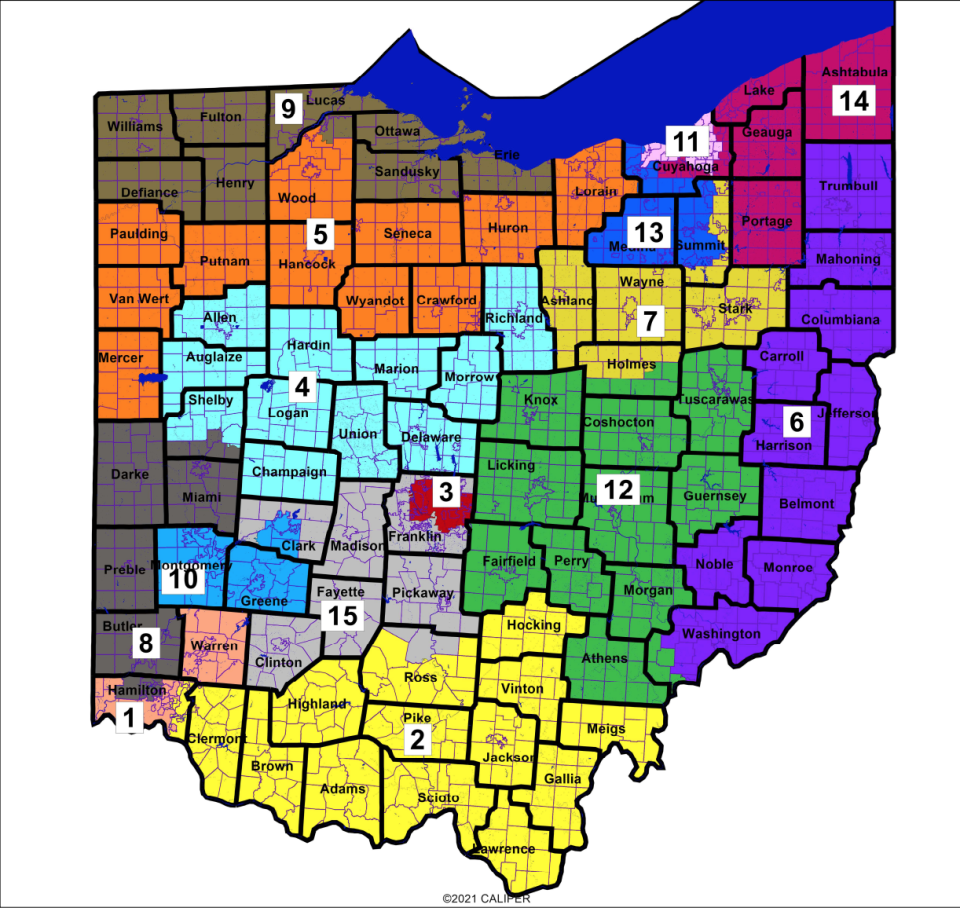Ohio Supreme Court orders redrawing of GOP-friendly map
Ohio's Supreme Court ordered a redrawing of the state's enacted congressional and legislative lines this week and said the Republican-friendly maps violate Ohio's constitution and redistricting reforms that passed last decade.
The pair of 4-3 rulings are a victory for anti-gerrymandering groups and Democrats, who were poised to lose two congressional districts and remain mired in the state legislative minority under the enacted maps.
In the court's conclusion, Justice Michael P. Donnelly noted that Republicans would be likely to win 12 of the 15 congressional districts under the enacted map, even though the party "generally musters no more than 55% of the statewide popular vote."
"When the dealer stacks the deck in advance, the house usually wins," writes Donnelly. "That skewed result just does not add up."
The majority ruling notes the congressional map violated a redistricting reform passed in 2018 by passing a plan "that unduly favors the Republican Party and disfavors the Democratic Party." It also took issue with how the map splits counties containing Cincinnati, Cleveland and Akron to combine urban voters with rural voters "to give Republican candidates a political advantage in all but two of the 15 congressional districts."
The court ordered Ohio's General Assembly to pass a new congressional map within the next 30 days, and if it fails to pass a "compliant" plan, the state's bipartisan seven-member redistricting commission will have 30 days to adopt a map.
The court's timeline is likely to cause headaches for candidates, since the state has an upcoming February 2 deadline and a May primary. Ohio Secretary of State Frank LaRose, a Republican member on the redistricting commission has not announced if either date will be changed.

On Wednesday, the commission was put on a tighter ten-day timeline to submit a new map to the state supreme court for its approval. Ohio Republican strategist Terry Casey said the court's decision on legislative lines was unclear about what changes must be made.
"It's a bit of a chess match for what happens next and what's the standard that they've got to meet and apply to this case," he said.
"The great part about that [2015] reform, is that there is this backstop of the Ohio Supreme Court, that has now stood with voters," said Jen Miller, director of the Ohio chapter of the League of Women Voters, who was the lead plaintiff in the lawsuits over the congressional and state legislative lines.
"This is a victory for Ohio voters who have been suffering with extreme partisan gerrymandering in this state for many decades," she added.
In a statement about the legislative lines, Republican Governor Mike DeWine wrote that he expected litigation over the maps from the start, and that he "will work with my fellow Redistricting Commission members on revised maps that are consistent with the Court's order."
In her decision on legislative lines, Chief Justice Maureen O'Connor suggested the creation of a nonpartisan, independent commission that had no lawmakers. Anti-gerrymandering advocates welcomed that idea, but it could mean yet another multi-million-dollar campaign to enact it..
"Having now seen firsthand that the current Ohio Redistricting Commission — comprised of statewide elected officials and partisan legislators — is seemingly unwilling to put aside partisan concerns as directed by the people's vote, Ohioans may opt to pursue further constitutional amendment to replace the current commission with a truly independent, nonpartisan commission," she wrote.
Ohio is one of more than a dozen states that currently litigating over their enacted congressional or legislative lines, according to the Brennan Center. North Carolina judges recently upheld Republican-drawn Congressional lines.
Families face budget strain as monthly child tax credit checks stop
Quebec to impose tax on those who refuse COVID vaccines
Massive cyberattack breaches several Ukrainian government websites

